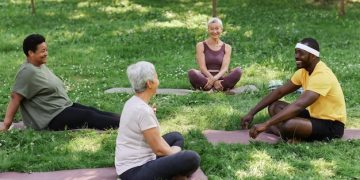Self-Care: Prioritize Well-being & Prevent Burnout

Self-care is essential for maintaining overall well-being and preventing burnout by incorporating practices that promote physical, emotional, and mental health into daily life.
In today’s fast-paced world, it’s easy to get caught up in the demands of work, family, and social life. That’s why understanding the importance of self-care: practical tips to prioritize your well-being and prevent burnout is pivotal for sustaining a healthy and balanced life.
Understanding the Essence of Self-Care
Self-care is often misunderstood as being selfish or indulgent. However, it’s a necessary component of a healthy lifestyle. It involves recognizing your own needs and taking proactive steps to meet them, ensuring that you are physically, emotionally, and mentally equipped to handle life’s challenges.
By integrating self-care into your routine, you can improve your mood, reduce anxiety, and enhance your ability to manage stress.
Defining Self-Care
Self-care encompasses a variety of activities that support your overall well-being. It can range from physical activities like exercise and healthy eating to mental and emotional practices such as meditation and journaling.
Why Self-Care is Not Selfish
Practicing self-care is not about neglecting responsibilities or ignoring others; it’s about ensuring you have the resources to care for them effectively. When you prioritize your own well-being, you’re better able to show up for others fully and authentically.

Without self-care, you risk depletion, which can lead to burnout, decreased productivity, and strained relationships.
- Improved Mood: Regularly engaging in self-care activities can significantly improve your mood and reduce feelings of depression and anxiety.
- Stress Reduction: Self-care practices help manage stress by activating the body’s relaxation response, which lowers heart rate and blood pressure.
- Enhanced Resilience: Prioritizing self-care builds resilience, enabling you to bounce back more quickly from setbacks and adapt to change.
Ultimately, understanding the essence of self-care is about acknowledging that you matter and that taking care of yourself is essential for a sustainable and fulfilling life.
The Importance of Prioritizing Your Well-Being
Prioritizing your well-being is vital for maintaining overall health and happiness. It’s about consciously choosing activities and habits that nurture your mind, body, and spirit.
When you make your well-being a priority, you set the foundation for a more balanced, productive, and joyful existence.
Benefits of Prioritizing Well-Being
The benefits of prioritizing your well-being extend to every aspect of your life. From improved physical health to enhanced emotional resilience, the impact is profound and far-reaching.
How Well-Being Impacts Physical Health
When you prioritize self-care activities like regular exercise, healthy eating, and sufficient sleep, you boost your immune system, reduce your risk of chronic diseases, and increase your energy levels.
Taking care of your body helps it function optimally, supporting your ability to live a vibrant and active life.
- Boosts Immunity: Adequate sleep, healthy diet, and regular exercise strengthen your immune system, helping you resist illness.
- Reduces Chronic Disease Risk: Prioritizing well-being minimizes your risk of developing chronic conditions like heart disease, diabetes, and obesity.
- Increases Energy: Regular self-care routines, such as balanced nutrition and physical activity, can significantly increase your energy levels and reduce fatigue.
Therefore, prioritizing your well-being is not just a luxury; it is a necessary investment in your long-term health and happiness.

Practical Self-Care Tips
Incorporating practical self-care tips into your daily life can be simple and effective. Starting with small changes, you can gradually build a routine that supports your well-being.
Here are several actionable strategies to help you prioritize your mental, emotional, and physical health.
Mindful Morning Routine
Start your day with intention by establishing a mindful morning routine. Instead of reaching for your phone, dedicate the first 15-30 minutes to activities that promote calm and focus.
Incorporate Physical Activity
Regular physical activity is crucial for both physical and mental health. Whether it’s a brisk walk, a yoga session, or a gym workout, find activities you enjoy and make them a consistent part of your routine.
- Walking: A simple walk can improve mood and cardiovascular health.
- Yoga: Combines physical postures, breathing techniques, and meditation for overall well-being.
- Strength Training: Builds muscle, boosts metabolism, and enhances physical strength.
Making an effort to care for yourself regularly can lead to significant improvements in your daily life, making you more resilient and better prepared to handle challenges.
Preventing Burnout Through Self-Care
Burnout is a state of emotional, physical, and mental exhaustion caused by prolonged or excessive stress. It’s often associated with feeling overwhelmed, emotionally drained, and unable to meet constant demands.
Self-care plays a crucial role in preventing burnout by helping you manage stress, replenish your energy, and maintain a healthy work-life balance.
Recognizing the Signs of Burnout
Identifying the early signs of burnout is the first step in preventing it. These signs can include chronic fatigue, cynicism, decreased performance, and feelings of detachment.
Setting Boundaries at Work
Establishing clear boundaries between your work and personal life is essential for preventing burnout. This includes setting limits on work hours, learning to say no to additional tasks, and taking regular breaks.
Creating boundaries can provide relief and help regain control over your life.
- Limit Work Hours: Set a specific time each day to stop working and stick to it.
- Say No: It’s okay to decline additional tasks if you’re already feeling overwhelmed.
- Take Breaks: Schedule regular breaks throughout the day to rest and recharge.
Through proactively implementing these self-care strategies, you can build resilience, manage stress, and cultivate a sustainable approach to both your professional and personal life.
Mindfulness and Meditation for Self-Care
Mindfulness and meditation are potent tools for self-care that can significantly reduce stress, improve focus, and enhance overall mental well-being. These practices involve training your mind to focus on the present moment, fostering a sense of calm and awareness.
Incorporating mindfulness and meditation into your daily routine can lead to profound and lasting benefits.
Understanding Mindfulness
Mindfulness is the practice of paying attention to the present moment without judgment. It involves observing your thoughts, feelings, and sensations as they arise, without getting carried away by them.
Meditation Techniques for Beginners
Meditation techniques can be simple to learn and practice, even for beginners. Start with guided meditations, which provide step-by-step instructions, or try focused breathing exercises.
Meditation helps cultivate inner peace and improves focus.
- Guided Meditations: Use apps or online resources to guide you through meditation sessions.
- Breathing Exercises: Focus on your breath to calm your mind and reduce stress.
- Mindful Walking: Pay attention to each step and the sensations in your body as you walk.
Regular practice of mindfulness and meditation can cultivate an inner sense of peace and resilience, even amid challenges.
Building a Sustainable Self-Care Routine
Creating a sustainable self-care routine involves identifying activities that you genuinely enjoy and integrating them seamlessly into your daily life. Consistency is key, so it’s important to choose practices that you can realistically maintain over time.
A well-structured self-care routine should address your physical, emotional, and mental needs, helping you to thrive in all areas of your life.
Assessing Your Needs
Before building a self-care routine, take time to assess your individual needs. Consider what areas of your life are causing you the most stress and what activities bring you the most joy and relaxation.
Scheduling Self-Care Activities
Treat self-care activities as non-negotiable appointments in your calendar. Schedule them in advance and protect that time as you would any other important commitment.
Scheduling ensures self-care receives the priority it deserves.
- Plan Ahead: Schedule self-care activities at the beginning of each week.
- Set Reminders: Use reminders to stay on track with your self-care schedule.
- Be Flexible: Adjust your routine as needed to accommodate changes in your schedule.
By building a sustainable self-care routine, you ensure that you consistently nurture your well-being.
| Key Point | Brief Description |
|---|---|
| 🧘♀️ Mindful Morning | Start your day with calm and focus. |
| 🏃♀️ Physical Activity | Regular exercise boosts health. |
| ⏰ Set Boundaries | Protect personal time from work. |
| 🧘♀️ Meditation | Reduce stress and improve focus. |
What are the benefits of regular self-care?
Self-care helps reduce stress, boosts immunity by contributing on a healthy lifestyle, enhances mood, prevents burnout, and improves overall well-being by investing in yourself.
Why is it important to set boundaries at work?
Setting boundaries at work prevents burnout. It helps maintain work-life balance, preserve energy, reduce stress promoting healthier and efficient work life.
How can mindfulness and meditation reduce stress?
Mindfulness and meditation reduce stress by focusing awareness on the present, calming the mind and reducing anxiety through relaxation techniques and improved emotional regulation.
What are some practical tips for self-care?
Practical tips for self-care include creating a mindful morning routine, incorporating regular physical activity, setting work boundaries, practicing meditation, getting enough sleep, and eating healthy.
How does prioritizing well-being impact physical health?
Prioritizing well-being enhances physical health by boosting the immune system, reducing chronic disease risks, increasing energy levels, and helping the body function optimally for an active life.
Conclusion
By understanding the importance of self-care and consistently implementing practical tips, you can significantly enhance your well-being, prevent burnout, and foster a more balanced and fulfilling life. Prioritizing self-care is not optional; it’s essential for long-term health and happiness.





